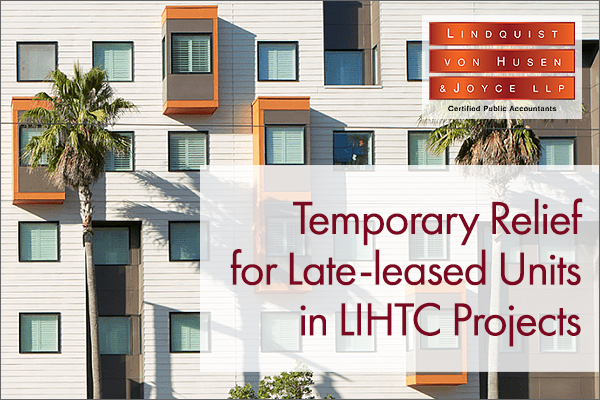
Notice 2021-12 released by the Internal Revenue Service on January 15, 2021 provided various extensions and modifications to the requirements for low income housing tax credits under Internal Revenue Code (IRC) Section 42. Please refer to our earlier blog, IRS Notice 2021-12 Provides LIHTC Relief and Extends Deadlines.
One modification in Notice 2021-12 that will affect the treatment of units that weren’t leased by the end of the first credit year is the topic of discussion here.
Section IV.E of Notice 2021-12 states the following:
E. EXTENSION TO SATISFY OCCUPANCY OBLIGATIONS
For purposes of § 42(f), if the close of the first year of the credit period with respect to a building is on or after April 1, 2020, and on or before June 30, 2021, then the qualified basis for the building for the first year of the credit period is calculated by taking into account any increase in the number of low-income units by the close of the 6-month period following the close of that first year.
The above modification impacts taxpayers that meet all of the following:
(1) end of tax year occurs between April 1, 2020 and June 30, 2021
(2) eligible to start their first year low-income housing credit in such year, and
(3) have one or more units in the LIHTC housing project that haven’t yet been qualified (i.e., leased to a qualified tenant) as of the end of such year.
For impacted taxpayers, the IRS is providing some relief for units that are (1) leased up after the end of the first credit year, and (2) leased by the close of the six-month period following the close of that first year. Pursuant to the IRS notice, the basis related to such a unit is to be included in the qualified basis for the first year of the credit period. Prior to the modification, the basis of such a unit is not included in qualified basis until a subsequent year in which the unit is leased to a qualified tenant. This is typically referred to as a ‘late-leased unit’. The increase in qualified basis for the late-leased unit in a subsequent year would then be eligible for the credit, at two-thirds of the normal credit rate, over the remaining 15-year compliance period.
The modification in the IRS notice allows the impacted taxpayer to include in qualified basis at the end of the first credit year the basis amounts that are attributed to the applicable units that haven’t yet been qualified as of the end of the first credit year. Such inclusion in Year 1 of the credit period would eliminate the late-leased situation with respect to these units, i.e., the credits for these units would not be subject to the reduced two-thirds credit rate.
Although the IRS Notice 2021-12 is silent on the computation of the Year 1 credit when basis of the ‘late-leased’ units is included in qualified basis in Year 1 of the credit period, we believe that such units will not generate any credits in Year 1 of the credit period. Normally, first year credits are calculated using an annual weighted average based on the number of months each unit is qualified. Units not yet qualified will not be entered into the weighted average computation and therefore, such units will not generate any credits in Year 1.
The IRS Notice 2021-12 is also silent on the computation of Year 2 credits for these late-leased units. Therefore, there exist some uncertainties. Prior to the issuance of the IRS notice, in Year 2 when the late-leased units are leased to a qualified tenant, the credit was calculated using the annual weighted average based on the number of months such units were qualified. The basis used in the calculation of the credits for these late-leased units was equal to the increase in qualified basis from Year 1 to Year 2.
Because of the modification in Notice 2021-12, there is no longer an increase in qualified basis from Year 1 to Year 2 for the applicable late-leased units. Due to the IRS notice, the basis of the units leased within the first six months of Year 2 is now already included in qualified basis at the end of Year 1.
Therefore, it appears that such units are not subject to the late-leased rules in which (1) credits are reduced by one-third, (2) credits are taken over the remaining 15-year credit period, and (3) computation of credit is subject to the weighted average method. Under IRC Section 42, for units that are not subject to the late-leased rules, the credit is determined by the units’ qualified basis on the last day of the credit period. Therefore, we believe the units will generate credits for the full 12 months in Year 2 as long as the units were leased within the first six months of Year 2 and the units are still in service on the last day of Year 2. It is uncertain if this is the result intended by the IRS. We expect to see further guidance to be issued by the IRS.
The late-lease relief in IRS Notice 2021-12 may impact an owner’s decision on deferring the start of the credit. Prior to the IRS notice, an owner may have decided to defer the start of credits to 2021 to avoid the late-lease situation because some units weren’t leased in 2020. However, because there is now late-lease relief, an owner may want to re-consider and start credits in 2020.
Please contact us at info@lvhj.com or your engagement lead member if you need more information or assistance in evaluating your situation.
You may also be interested in our blog post about the minimum 4% housing credit floor rate as part of the Consolidated Appropriations Act 2021.








